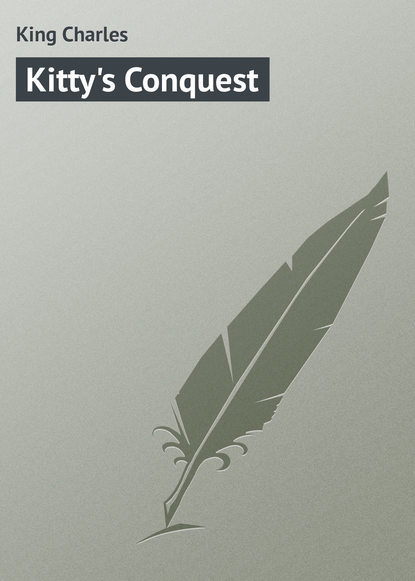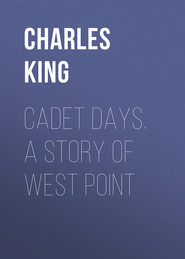По всем вопросам обращайтесь на: info@litportal.ru
(©) 2003-2024.
✖
Kitty's Conquest
Автор
Год написания книги
2017
Настройки чтения
Размер шрифта
Высота строк
Поля
I involuntarily sprang up and approached the table. He had written half the message, then dropped pencil and hammered away at the key.
"For him," said he, with a backward jerk of the head to indicate the colonel.
It seemed an endless time before he could get the thing straightened out and the message written.
"Please wake him," said he.
I gently shook Harrod's shoulder. He started up with soldierly promptitude.
"Train coming?" he asked, as he began gathering his traps.
"Not yet, colonel. It's news from the boys, the cavalry."
"Got to New Orleans all right?"
"Got there; but – read for yourself."
With a face that paled even in the dim light of the station, and lips that trembled under his moustache, the colonel read, handed it to me without a word, and turned away.
This was the message:
"New Orleans, Tuesday.
"Colonel H. Summers, Sandbrook Station, M. and C. R. R., Alabama.
"Arrived yesterday. Vinton dangerously ill; delirious. Post surgeons in charge. If possible, come.
"Frank Amory."
Then we three looked at one another with faces sad and blanched. Harrod was the first to speak.
"May I take your horse, Billy?"
"Yes, and the house and barn if it'll help."
"Then I'm off for home at once, for Pauline."
The delay of that train was a blessing in disguise.
CHAPTER VIII
A dim, murky morning it was that dawned on Sandbrook the following day. I had spent the livelong night at the station. The missing train came unheeded, soon after Colonel Summers on "Billy's" horse loped off into the northern darkness. I had sent a dispatch to Amory, care of Department Headquarters in New Orleans. "Billy" had hospitably invited me to share his humble breakfast, made most relishable though by the steaming coffee "cooked" army fashion in a battered old pot with a reliable lid. I had noted with respect and with pleasure the fine picture of General Lee hanging over the narrow mantel, and the battered old cavalry sabre beneath it; and was beginning to ask myself how I could best employ the day until evening train-time, when the rapid beat of hoofs and the familiar rattle of the carriage-wheels sounded in my ears.
"Hyar they come," said "Billy." "I knew they would."
Even before we could reach the platform, the carriage had whirled up there and Harrod sprang from the box-seat.
"That freight gone by yet, Billy?"
"The freight! Lord, no! Colonel, you're not going to take Miss Summers that way?"
"It hasn't gone, dear," he quickly spoke to the silent inmate of the carriage. "But it's due how soon?" turning again to his friend.
"Ten minutes, colonel, and on time, too, if you're bound to go by her."
"By all means. We may strike something at Corinth; if not, we'll go on to the Junction." Then with lowered voice, "Anything is better than waiting at such a time. We'd better get them out, I think."
Them! Who could be there? thought I, for up to this time I had thought best not to intrude. Now I stepped forward as he opened the carriage-door, and with light, quick spring out popped Kitty.
"Mr. Brandon will take charge of you, Kit; there's a dear," said he, gently, then turned again to the door, and tenderly handed out his sister. She came instantly to me with dry eyes, and firm, low voice, only with face so pale. She frankly held forth her hand, which – which I took in both my own.
"Have you heard anything further?"
I shook my head.
"And you have been sitting up here all night waiting for us. How kind, yet how tired you must be!"
"I never expected you till evening," I answered, bluntly, and was rewarded by a look of quick, reproachful surprise.
"Harrod reached us at one o'clock. It took very little time to get ready. Mr. Brandon, can you make any conjecture as to the nature of his illness?"
"None whatever; fever of some kind, I am half inclined to believe, contracted while off on this court-martial tour."
She bowed her head, and now silent tears fell from her eyes. Harrod led her to one side and, putting his arm around her, stood whispering cheeringly to her. Then I turned to Kitty, who was very quietly engaged in getting out satchels, baskets, and travelling-bags; all was done before I reached her.
"It is a surprise to see you, Miss Kitty."
"A surprise! Surely you did not suppose I would let Paulie go on so sad a journey without me. There are many ways in which I can help her."
There was no answer to the wisdom of that statement. The distant whistle of the freight had twice been heard, and in ten minutes our party of four were disposed in the conductor's caboose. The situation had been explained to that officer in very few words by Harrod and "Billy;" and, with that almost chivalrous courtesy which the roughest-looking men in the South show to the gentler sex on all occasions I ever witnessed, the train-hands had busied themselves in making a comfortable corner for the ladies. Rude and poor were the appliances, but Walter Raleigh never laid down his priceless cloak for foot of royal mistress with truer grace than did those rough ex-soldiers spread their blankets, coats, and pillows to make a soft substructure for the heavy shawls which the ladies had with them. Watching, as I have on a thousand occasions, the gentle courtesy of Southern men to women, high or low, I never lack for explanation, never wonder how they came to fight so well. Bayard Taylor struck the key-note when he wrote, —
"The bravest are the tenderest,
The loving are the daring."
At noon we were at Corinth and eagerly questioning the officials there. No train till nine.
"What chance by going to Grand Junction?"
"No better, colonel; they've had the customary smash-up on the Central, and 'taint no use trying. Even if the road weren't blocked, their south-bound express don't get off as early as ours from here."
"Are there no trains coming south, not even freight?"
"Colonel, I'm sorry, but there's not a train of any kind, – nothin' except a special, going through a-whoopin' for Orleans, I suppose, with a lot o' damyankees."
"What! a special with troops, do you mean?" asked Harrod, eagerly.
"Exactly; somewhere from up in Tennessee. Two or three companies – but, Lord! you couldn't ride with them even if they'd let you. They telegraphed ahead here for coffee for seventy men, and want to take the kettles on to the next station. Not much – "










